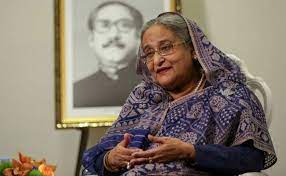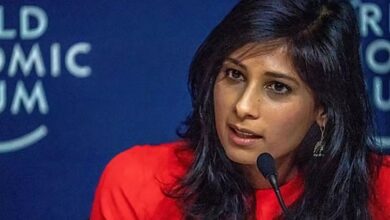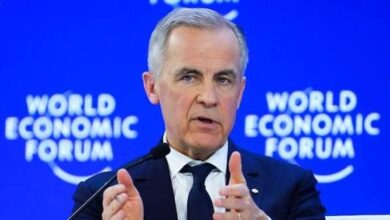Bangladesh Plans Return To 1972 Secular Constitution, Amidst Riots Against Hindus
Subir Bhaumik

Bangladesh’s ruling Awami League government seems to have decided on a return to the 1972 secular constitution , scrapping Islam as state religion, in the same week that witnessed attacks on Hindus mounted over blasphemy rumours since Oct 13 , leaving eight dead so far and hundreds of Hindu households and dozens of temples vandalised in a week.Radical Islamists threatened more violence if the Awami League government tabled a proposed bill to bring back the 1972 secular Constitution which was undermined by military ruler H.M Ershad’s declaration of Islam as state religion in 1988.
Even some Awami League leaders , like former Dhaka City Mayor Sayeed Khokon , publicly opposed the announcement by junior information minister Murad Hassan that Bangladesh is a secular country that would revert to the 1972 constitution enacted by the Father of the Nation, Sheikh Mujibur Rahman.
They questioned the timing of Hassan’s announcement as “pouring more oil on a raging fire.”
But Murad Hassan was insistent. ” We have the blood of freedom fighters in our body. At any cost, we have to go back to the constitution of ’72. I will speak in Parliament to go back to the constitution … Even if no one speaks, Murad will speak in Parliament,” the junior information minister told a public event. “I do not think that Islam is our state religion. We’ll go back to the constitution of 1972. We’ll get that bill enacted in parliament under Prime Minister Sheikh Hasina’s leadership,” Murad Hassan said. “We’ll soon return to the 1972 secular constitution.” If that happens,
Islam will no longer be the state religion of Bangladesh , more than 90 percent of whose population are Muslims.
Hardline Islamist clerics, close to radical groups like Jamaat e Islami and Hifazat e Islam, threatened to unleash a bloody campaign if any such bill was tabled . ” Islam was the state religion, it is the state religion, it will remain the state religion. This country was liberated by Muslims and their religion cannot be insulted,” said Hifazat secretary general Nurul Islam Jihadi. ” We will make every sacrifice to stop scrapping Islam as state religion.”
Even Awami Leaguers like former Mayor Khokon opposed Murad Hassan’s announcement on grounds it had “not been discussed in party forums in any detail.”
But some party leaders say Murad is “too junior a leader to make such a statement on his own steam” and feel he was the backing of Prime Minister Sheikh Hasina.
“If Hasina was not on board before such an announcement and when the country is facing so much violence against Hindus, she would have surely admonished Murad Hassan. Since that has not happened, there is good reason to believe the Prime Minister has given the green signal,” said one top Awami League leader but on condition of anonymity because he was not authorised to speak to media.
Murad’s announcement came on Oct 14, a day after angry Muslim mobs attacked Hindu temples in Comilla, Chandpur, Feni, Noakhali and Chittagong after a picture of the Holy Qu’ran at the feet of a Hindu God circulated extensively on Facebook. Police opened fire at Chandpur’s Hajiganj killing four Muslim rioters , even as two Hindu priests and as many devotees were stabbed to death in neighbouring Noakhali.
The violence spread to 23 districts, forcing PM Hasina to call out border guard troops and units of the elite Rapid Action Battalion (RAB) to control the rioting in what was the worst outburst of religious rioting since she came to power 12 years ago.
Hasina called for “such tough and exemplary punishment that none will dare repeat these acts of violence” , even as police arrested more than 200 rioters, among them two small shopowners in Comilla who had allegedly placed the Qu’ran at the feet of the Hindu God and circulated the pictures.
One of them , Foyez Ahmad, has worked long years in Saudi Arabia before returning to Bangladesh to set up his own business.
Awami League blamed the Islamist opposition parties like BNP and Jamaat e Islami for provoking religious rioting to disrupt the biggest Hindu festival , the five day Durga Puja that began Oct 11. Its Commilla women wing leader Aysha Zaman told BBC : ” The Quran photographed in the feet of the Hindu God was printed in Saudi Arabia. BNP Mayor Monirul Islam Sakku and businessman Foyez planted it using a wayward guy Iqbal Hossain. Now the CC footage has shown Iqbal doing it. This was a planned attempt to whip up Muslims into frenzy.”
Like in Nasirnagar five years ago, this time also the social media was used to spread the picture with calls to ‘avenge the insult to Islam’.
Bangladesh was born in 1971 as a secular nation on the basis of la strong wave of Bengali cultural and linguistic nationalism that abnegated orthodox Islamic practices of Pakistan, from which it emerged.
The 1972 Bangladesh constitution enshrined equality of all faiths. But four years after Liberation from Pakistan, a bloody coup led to the assassination of the founding father Sheikh Mujibur Rahman with much of his family. Only daughters Sheikh Hasina, now Prime Minister, and her sister Sheikh Rehana survived.
The military rulers , Generals Ziaur Rahman and H M Ershad, pampered the Islamist parties like the pro Pakistan Jamaat e Islami , allowed them to register with the Election Commission and finally instituted Islam as the state religion.
“The military rulers wanted to create a political base against the Awami League in an effort to marginalise it. So they opted for Pakistan type Islamist politics to counter the Awami League’s Bengali nationalism. Both Zia and Ershad created parties that played the religious card against the Awami nationalism,” says Sukharanjan Dasgupta, author of “Midnight Massacre”, a book on 1975 military coup.
Awami youth leader and “Digital Bangladesh’ organiser Sufi Farooq says Ershad was known for drinking and womanising, rarely prayed and wrote some poetry. ” But for him , Islam was a political tool, like it was for Jinnah who ate pork and drank Scotch whisky and rarely prayed.”
During the two decade of military rule and another two five year terms of BNP and Jamaat e Islami coalition in power ( 1991- 1996 and 2001- 2006) , Hindus faced huge persecution and tens of thousands migrated to India. Hindus, accounting for 22 percent of Bangladesh’s population, nosedived to just below 10 percent in 2010 Census . But in the last ten years of Awami League rule , their population has risen to 12 percent of the country’s population , according to the Bangladesh Bureau of Statistics . “This means the outmigration of Hindus have dropped and the normal growth rate has brought up the numbers,” said Sufi Farooq.
Former junior information minister Tarana Halim says the country’s Islamist ecosystem targets Hindus in the rundown to elections. ” The latest anti Hindu violence during the Durga Puja should be seen in that context,” said Halim. “The Islamists are morally boosted by the Taliban takeover in Afghanistan but apprehensive of a repeat Awami League victory in the parliament polls due in Dec 2023.”
Targetting Hindus as soft targets because they are a decisive factor in fifty of the 300 parliament seats is an easy way out for the Islamist parties, says veteran minister Amir Hussain Amu .
” This is a matter of great shame if we can protect the Hindus. We have to do it at all cost,” says Barrrister Shah Ali Farhad, special assistant to PM and now an Oxford Fellow.
This is why perhaps Hasina has decided to take the Islamists head on by planning a return to the 1972 secular constitution and Murad Hassan’s announcement was just the testing of waters.



